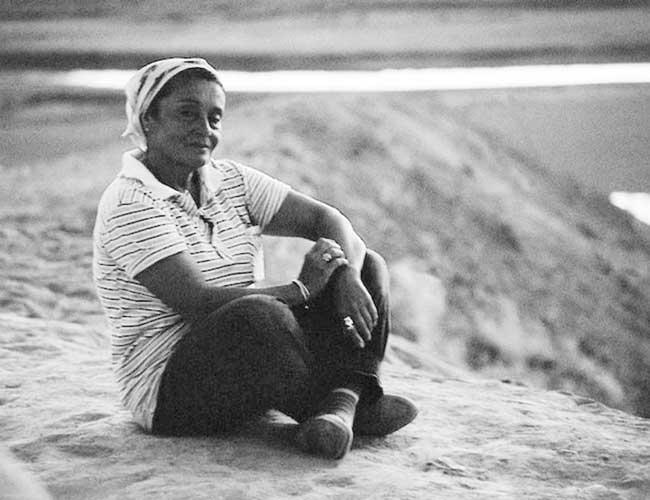Farewell to the Hittite queen

It was the day before International Women’s Day when I heard the news about the funeral of our Hittite Queen Puduhepa.
No, I’m not hallucinating as though I’m on a rollercoaster ride in a time machine, but for many who knew her, the late Hittitologist Prof. Muhibbe Darga was like the reincarnation of the Hittite Queen, wife of King Hattusili III, who lived in 13th century BC.
Today, more than three millennia after her time, Puduhepa is still considered as one of the most influential women known in Anatolian history, or from the entire ancient Near East. Dedicating her life to the research of Hittite culture, Prof. Darga was surely one of the most influential women in archaeology in Turkey.
Puduhepa has always been depicted as hand in hand with her husband, always appearing by his side as he performed his rulings and decisions, never at a secondary position as a subservient to the king.
She played an important role in diplomacy of her period conducting relations with Ancient Egypt, exchanging letters with King of Egypt Ramesses II. Her direct communication with the Egyptian king was an indication of her equal status with men. According to findings in excavations, Anatolian women played an active part in administration and trade up to 4,000 years ago.
Clay tablets unearthed during excavations at the Kültepe Kaniş/Karum Mound in the Central Anatolian province of Kayseri reveal that women were very active in trade and sought their rights if there was a dispute.
Apparently during the Hittite period Anatolia was a heaven for women. The king’s seal was not enough to approve a treaty, the queen’s seal was also necessary, which indicates that queens were equal to kings in administration. Puduhepa also carried the title of “Tawananna,” a lifelong accolade of Hittite queens, kept even after the death of the king. After the death of her husband, Puduhepa held her title and ruled the Hittite kingdom.
Prof. Muhibbe Darga had such a vibe. Wherever she appeared she walked to the stage like a queen. Her charisma ruled the atmosphere despite her tiny body.
She came from an elite Ottoman family, her grandfather was from the first chamberlain of Sultan Abdülhamid, and also a poet and translator of Jules Verne’s novels. She traveled through Anatolia with her family at an early age due to her father’s work. History, literature and art were always at their table discussions. Her passion for archaeology led her career choice; she studied Hittitology at Istanbul University. She accompanied Prof. Theodor Bossert, the famous German archaeologist and philologist best known for discovering the Hittite fortress city of Karatepe and discovering bilingual inscriptions, in his studies in Anatolia. The discovery of the bilingual tablets enabled the translation of Hittite hieroglyphs, and in a way the discovery led the path for us to understand the power of Puduhepa and her contemporary Hittite women. Muhibbe Darga not only had many publications in Hittite culture but she always emphasized on the role of women in Anatolian civilizations. In her book “Woman in Anatolia,” she stressed the status of women in this land, drawing the attention of not only intellectuals but also the general public.
I was lucky to have known her since my childhood, as she had been in the close circle of my mother Prof. Gönül Öney, an art historian. I remember her dancing along the coast of the Danube in Budapest when we were all attending the Congress of Turkish Art History back in the 1970s. She was definitely the queen of hearts when it came to parties and she was never short of theatrical drama when it came to her flirts. I’ll never forget the moment when I went to her home 10 years ago to consult about the use of poppy seeds in Hittite cookery. At the age of 86 she still had the energy and enthusiasm of a young assistant. She opened up a huge dusty textbook, a textbook of cuneiform texts, and started to read the text, which was in Hittite language with great ease and speed. She would often say, “See, it writes here!” pointing words, which looked totally alien to me. The word we were looking for was gis-haššikka, probably the origin of the word haşhaş, the word for poppy in Turkish. She eventually concluded that haššikka was indeed haşhaş, but added, while giggling: “But you know it also means something else!” What she meant was the most common swear word in Turkish. Oh God, that comment was not what I expected from a reputed scholar who was my mother’s friend in her late 80s. Startled by her vivacious personality, I was totally inspired and wrote one of the best papers ever in my own food writing history and eventually won a Sophie Coe award for my poppy article. Long live Muhibbe Darga, you have been a true inspiration and you’ll always be remembered!
Fork of the Week
Muhibbe Darga even wrote a little cookbook in her prolific career. The book is naively charming, titled “The Cauldron of Head of Excavation: Recipes from an Archaeology Fellow,” and gives recipes from the daily life of her excavations, which apparently had parties whenever possible. At one instant she smashes moldy blue cheese with two tablespoons of whisky and spreads on thinly sliced dense rye bread and suggests having it with champagne, preferably before lunch, as champagne can be enjoyed at any hour regardless of the time of the day. A true bon vivant… Cheers to you, our eternal Puduhepa!
Cork of the Week
Hittites were the first to write rules and laws regarding vineyards. Keeping early domesticated grape (Vitis vinifera) vineyards was a strong aspect of Hittite agriculture, they had a great viticulture, and they did their best to safeguard vineyards. Even to cut down a single vine was prohibited and punished severely. Thanks to their legacy Anatolia has been home to a great variety of indigenous grapes, most are yet to be integrated to modern winemaking. At the recent Gustobar Sommelier Selection Wine Tasting, one new bottle caught our eyes. Kuzeybağ Öküzgözü 2016 from Elazığ boosts with Anatolian grape flavors, with a 10-15 percent Kösetevek grape along with the luscious Öküzgözü grape. Worth trying with a hearty Anatolian dish or spit roasted lamb, as if enjoying a Hittite feast.












